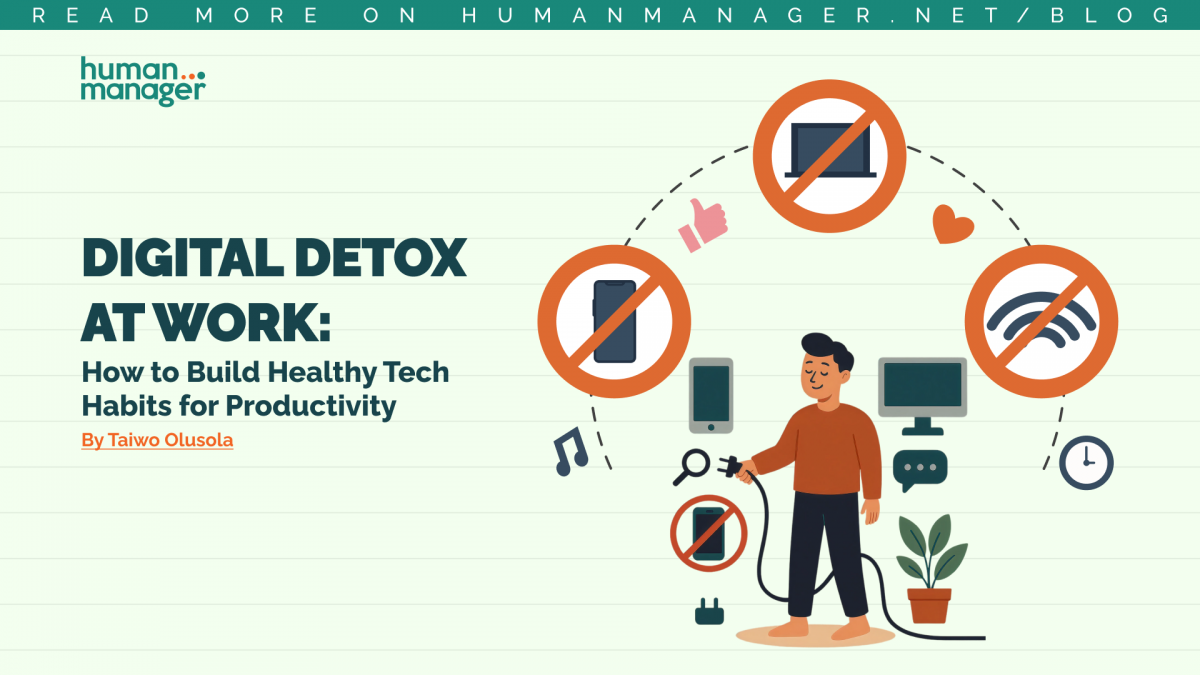By Taiwo Olusola
In a city that never sleeps, are employees truly resting?
For many professionals navigating the fast-paced, hyper-connected urban workplace, the drive to succeed often comes at a hidden cost. The rise of digital tools has made collaboration seamless and productivity higher, but it has also blurred the boundaries between office hours and personal time.
This “always-on” culture, while seemingly efficient, quietly erodes employee well-being, making true rest a rare luxury. That’s why a digital detox at work is no longer a buzzword; it’s a necessary strategy for healthier, more balanced workplaces.
Why Digital Detox Matters in Africa’s Workforce
This is not just a global phenomenon; it is a pressing reality across African cities, where the hustle often overshadows the need for mental respite. Without healthy tech habits, organisations risk a workforce teetering on the brink of burnout.
For years, employee well-being has focused on physical health and financial stability. While crucial, the digital age demands we expand this to include digital well-being. Constant connectivity means emails at midnight, Slack or Teams pings during dinner, messages on weekends – creates a double-edged sword that looks like dedication but leads to burnout.
The Cost of an Always-On Culture
A study on healthcare workers in Lagos Metropolis, Nigeria, highlighted a significant correlation between the lack of digital detox practices and increased burnout rates. This pattern is not unique to healthcare; it cuts across industries like finance, education, and tech. The fallout is real:
- Reduced productivity and creativity
- Higher error rates due to fatigue
- Increased stress and disengagement
- Weaker collaboration within teams
Imagine an employee drained from late-night emails making costly errors the next morning. Or a manager, glued to notifications, unable to engage meaningfully in a brainstorming session. These scenarios are daily realities in many fast-paced organisations.
Practical Strategies for Digital Detox at Work
- Setting Clear Boundaries: Implement guidelines around after-hours communication. Unless it’s an emergency, employees shouldn’t feel pressured to respond outside office hours. Boundaries restore work-life balance and reduce stress.
- Encouraging ‘Unplugged’ Breaks: Promote short, technology-free breaks during the day. Even 15 minutes of walking, meditation, or offline conversation can refresh the mind and improve focus.
- Lead by Example: Leaders must model the behaviour they expect. Sending midnight emails signals to teams that they should always be “on.” Instead, consciously log off and encourage employees to do the same.
- Use Technology to Support Well-being: Ironically, the right tech can help with digital detox. HR solutions like HumanManager streamline processes so employees don’t drown in multiple tools.
- Leave Module: Makes requesting and approving time off seamless.
- Centralised HR Processes: Reduces the need for juggling apps, cutting down on digital fatigue.
- HumanManager Mobile App: Offers controlled, convenient access without overwhelming employees with unnecessary alerts.
The Future of HR: Beyond Productivity to Well-Being
Digital detox is a necessity for a sustainable and productive workforce. By building healthy tech habits and leveraging integrated HR solutions like HumanManager, organisations can empower employees to reclaim personal time, foster creativity and engagement, build resilience in the workplace, and nurture all-round human well-being in a digital world.
The future of HR isn’t just about payroll or compliance; it’s about protecting the human side of work in an always-on age.
For more insights and updates, join our growing LinkedIn community: The HR Growth Circle.
